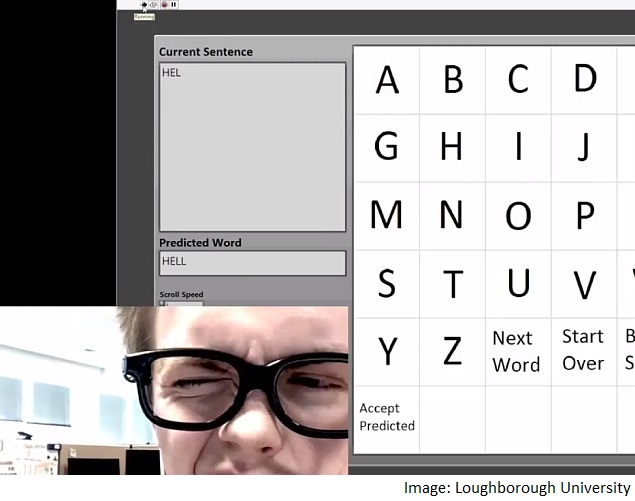- Home
- Science
- Science News
- New Low Cost Device to Help the Paralysed Communicate
New Low-Cost Device to Help the Paralysed Communicate

A British mechanical engineering student has designed a low-cost digital letter board that allows victims of paralysis to communicate without the need of an interpreter.
With the help of a software, the device detects eye blinks or finger movements and converts the movements into sentences before reading them aloud.
"I have been able to create a prototype at a total cost of GBP 164 (roughly Rs. 16,360)," said Robert Green from Loughborough University in a statement.
"I hope to significantly improve the lives of people suffering from degenerative conditions by giving a voice to those who are unable to speak and who have very limited body movement," Green noted.
The low-cost system uses an optical reflectance sensor, a pair of 3D cinema glasses and two resistors. The finger movement detection circuit comprises of a simple switch, which in the case of the prototype is an up cycled doorbell to provide a large, sturdy surface to press on.
The sensor is mounted onto the frame of the glasses close to the user's eyes and emits an infra-red signal at the white of the user's eye.
The software then analyses the signal to detect whether or not a change has taken place. It is at this point that the user is able to scroll and select letters from a digital letter board to form sentences which are then read aloud by the computer, aided by a predictive text function.
For the latest tech news and reviews, follow Gadgets 360 on X, Facebook, WhatsApp, Threads and Google News. For the latest videos on gadgets and tech, subscribe to our YouTube channel. If you want to know everything about top influencers, follow our in-house Who'sThat360 on Instagram and YouTube.
Related Stories
- Samsung Galaxy Unpacked 2025
- ChatGPT
- Redmi Note 14 Pro+
- iPhone 16
- Apple Vision Pro
- Oneplus 12
- OnePlus Nord CE 3 Lite 5G
- iPhone 13
- Xiaomi 14 Pro
- Oppo Find N3
- Tecno Spark Go (2023)
- Realme V30
- Best Phones Under 25000
- Samsung Galaxy S24 Series
- Cryptocurrency
- iQoo 12
- Samsung Galaxy S24 Ultra
- Giottus
- Samsung Galaxy Z Flip 5
- Apple 'Scary Fast'
- Housefull 5
- GoPro Hero 12 Black Review
- Invincible Season 2
- JioGlass
- HD Ready TV
- Laptop Under 50000
- Smartwatch Under 10000
- Latest Mobile Phones
- Compare Phones
- Honor Magic 7 RSR Porsche Design
- Moto G15 Power
- Moto G15
- Realme 14x 5G
- Poco M7 Pro 5G
- Poco C75 5G
- Vivo Y300 (China)
- HMD Arc
- Asus Zenbook S 14
- MacBook Pro 16-inch (M4 Max, 2024)
- Honor Pad V9
- Tecno Megapad 11
- Redmi Watch 5
- Huawei Watch Ultimate Design
- Sony 65 Inches Ultra HD (4K) LED Smart TV (KD-65X74L)
- TCL 55 Inches Ultra HD (4K) LED Smart TV (55C61B)
- Sony PlayStation 5 Pro
- Sony PlayStation 5 Slim Digital Edition
- Blue Star 1.5 Ton 3 Star Inverter Split AC (IC318DNUHC)
- Blue Star 1.5 Ton 3 Star Inverter Split AC (IA318VKU)

















